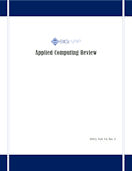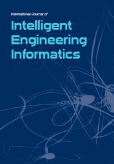
Machine Learning and Knowledge Extraction
metrics 2024
Advancing Insights in Machine Learning and Data Extraction
Introduction
Machine Learning and Knowledge Extraction, published by MDPI, is an esteemed Open Access journal that has been at the forefront of disseminating cutting-edge research since its inception in 2019. Based in Switzerland, this journal has established itself as a significant contributor to the fields of Artificial Intelligence and Engineering, currently ranking in the Q2 category in Artificial Intelligence and Q1 in Engineering (miscellaneous) for 2023. With a notable Scopus ranking, it holds the 35th position out of 204 in Engineering, placing it in the 83rd percentile, while it ranks 127th out of 350 in Computer Science, reaching the 63rd percentile. Machine Learning and Knowledge Extraction serves as a vital platform for researchers, professionals, and students alike, promoting insightful discussions, innovative methodologies, and profound discoveries in machine learning and data extraction techniques. The journal's open access model ensures that groundbreaking research is widely accessible, fostering collaboration and advancing knowledge across various disciplines.
Metrics 2024
 -
- 4.00
4.00 4.00
4.00 -
-Metrics History
Rank 2024
IF (Web Of Science)
JCI (Web Of Science)
Quartile History
Similar Journals

KNOWLEDGE AND INFORMATION SYSTEMS
Bridging Theory and Practice in Information SystemsKNOWLEDGE AND INFORMATION SYSTEMS, published by SPRINGER LONDON LTD, is a distinguished journal in the field of information systems, artificial intelligence, and human-computer interaction. With its ISSN 0219-1377 and E-ISSN 0219-3116, this journal has built a robust reputation since its inception, featuring a convergence of valuable research from 2005 through 2024. Catering to a diverse academic audience, it is classified among the leading journals in its category, proudly holding a Q1 ranking in Information Systems and Q2 rankings in multiple other domains. The journal aims to publish cutting-edge research that not only advances theoretical understanding but also provides practical applications within these rapidly evolving fields. Although it is not an Open Access journal, subscribers can access a wealth of knowledge critical for researchers, practitioners, and students looking to enhance their expertise. With a 2023 Scopus rank placing it within the 66th percentile for Information Systems, KNOWLEDGE AND INFORMATION SYSTEMS is an invaluable resource for those committed to pushing the frontiers of knowledge in technology and information science.

International Journal of Machine Learning and Cybernetics
Advancing the Frontiers of AI and CyberneticsInternational Journal of Machine Learning and Cybernetics, published by SPRINGER HEIDELBERG, serves as a pivotal platform for scholars and practitioners in the fields of Artificial Intelligence, Computer Vision, and Software Engineering. With its impressive Q2 and Q1 rankings in esteemed categories such as Artificial Intelligence and Computer Vision and Pattern Recognition, this journal boasts a commendable reputation within the academic community, further solidified by its Scopus rankings that place it in the top percentiles of its category. This journal covers critical advancements and research trends spanning the years from 2010 to 2024, facilitating knowledge exchange that drives innovation in machine learning and cybernetics. Although it operates under a subscription model, it remains accessible for extensive readership, comprising researchers, professionals, and students eager to advance their understanding in this dynamic and rapidly evolving discipline. Stay at the forefront of technology by engaging with the latest findings and methodologies published in this influential journal, identified by its ISSN 1868-8071 and E-ISSN 1868-808X.

Applied Computing Review
Transforming Theory into Practice for Tomorrow's SolutionsApplied Computing Review is a prominent academic journal published by the Association for Computing Machinery (ACM), an esteemed organization known for advancing the computing profession. Focusing on the intersection of practical applications and theoretical foundations, this journal serves as a vital platform for disseminating research in the field of applied computing, facilitating knowledge sharing among researchers, professionals, and students alike. With an ISSN of 1559-6915, the journal encompasses a wide array of topics including software engineering, data analytics, and application development, addressing current trends and challenges in the industry. Although it does not offer open access, its rigorous peer-review process ensures high-quality publications that significantly contribute to the discipline. Positioned within a competitive landscape, Applied Computing Review is dedicated to fostering innovation and providing insightful perspectives that inspire further research, thereby solidifying its importance in the field of applied computing.

Big Data and Cognitive Computing
Catalyzing Discoveries in Artificial Intelligence and Data Science.Big Data and Cognitive Computing is a premier open-access journal published by MDPI, dedicated to advancing research in the dynamic fields of artificial intelligence, computer science, information systems, and management information systems. Since its inception in 2017, the journal has established a significant presence, reflected in its impressive categorization within the Q2 quartiles for multiple disciplines in the 2023 rankings. Situated in Switzerland, the journal provides a vital platform for researchers, professionals, and students to publish groundbreaking work and access high-quality articles, enhancing the exploration of big data applications powered by cognitive computing. With an increasing global emphasis on data-driven decision-making, Big Data and Cognitive Computing offers unrestricted access to innovative research findings, addressing both theoretical and practical aspects. The journal's contributions are integral for those looking to stay at the forefront of technological advancements and their implications across various sectors.

NEURAL COMPUTING & APPLICATIONS
Driving Insights in Artificial Intelligence ApplicationsNEURAL COMPUTING & APPLICATIONS is a premier journal dedicated to the burgeoning fields of Artificial Intelligence and Software Engineering, published by Springer London Ltd. Established in 1993, the journal serves as a pivotal platform for disseminating cutting-edge research and innovative applications in neural computing, covering a broad range of topics from algorithm development to real-world applications. With its impressive categorization in the 2023 Journal Quartiles—ranging Q2 in Artificial Intelligence and Q1 in Software—it stands out in its discipline, ranking 42nd out of 407 in Computer Science Software and 50th out of 350 in Computer Science Artificial Intelligence, reflecting its significant impact in the academic community. Although not an open access journal, it provides vital access to significant findings and methodologies that drive advancements in technology. Researchers, professionals, and students looking to stay abreast of the most relevant and impactful developments in these fields will find NEURAL COMPUTING & APPLICATIONS an indispensable resource.

International Journal of Intelligent Engineering Informatics
Transforming Ideas into Intelligent Solutions.International Journal of Intelligent Engineering Informatics, published by INDERSCIENCE ENTERPRISES LTD, stands at the forefront of research in the interdisciplinary domains of computer science, artificial intelligence, and human-computer interaction. With an ISSN of 1758-8715 and E-ISSN of 1758-8723, this journal serves as a vital resource for researchers and professionals seeking to explore the latest advancements in intelligent engineering and informatics techniques crucial for the evolution of modern technologies. Although currently not an open-access publication, it provides a necessary platform for disseminating high-quality research; its impact factor continues to grow, attracting a diverse readership interested in signal processing, software development, and computer vision. Covering innovative topics from 2022 to 2024, the journal is committed to fostering scholarly dialogue that paves the way for emerging trends and applications in the field, ensuring its relevance and significance in today's rapidly advancing technological landscape.

Wiley Interdisciplinary Reviews-Data Mining and Knowledge Discovery
Empowering researchers to discover knowledge through data.Wiley Interdisciplinary Reviews: Data Mining and Knowledge Discovery is a premier journal published by WILEY PERIODICALS, INC, dedicated to the rapidly evolving fields of data mining and knowledge discovery. Since its inception in 2011, this journal has emerged as a vital resource for researchers and practitioners alike, boasting an impressive Q1 ranking in the field of Computer Science (miscellaneous) as of 2023, and is recognized for achieving a remarkable 98th percentile in Scopus rankings. The journal aims to disseminate high-quality, interdisciplinary research that addresses the theoretical and practical implications of data mining techniques, innovative algorithms, and knowledge discovery paradigms. With a commitment to fostering knowledge exchange among academia and industry, Wiley Interdisciplinary Reviews is essential for those looking to remain at the forefront of data science advancements. Researchers and professionals will find relevant discussions, cutting-edge methodologies, and comprehensive reviews that contribute significantly to the field's development.

MACHINE LEARNING
Exploring Pioneering Research in Machine LearningMACHINE LEARNING is a premier academic journal published by SPRINGER, dedicated to advancing the field of artificial intelligence and software engineering. Established in 1986, this journal has consistently showcased pioneering research and innovative methodologies that facilitate the understanding and application of machine learning techniques across various domains. With an impressive impact factor reflecting its high-quality publications, it is classified within the top quartile (Q1) in both Artificial Intelligence and Software categories as of 2023, underscoring its critical role in these fields. The journal boasts significant Scopus rankings, placing it at the 45th and 54th positions, respectively, in Computer Science - Software and Computer Science - Artificial Intelligence, further validating its stature as a vital resource for researchers, professionals, and students alike. While not an open-access journal, MACHINE LEARNING ensures that its comprehensive peer-reviewed articles are widely circulated, fostering academic dialogue and innovation. The journal continues to be a go-to platform for cutting-edge research, providing invaluable insights and contributions that drive the future of machine learning.

DATA MINING AND KNOWLEDGE DISCOVERY
Exploring the Frontiers of Data Science and AnalyticsDATA MINING AND KNOWLEDGE DISCOVERY, published by Springer, stands as a premier journal within the realms of Computer Networks and Communications, Computer Science Applications, and Information Systems. With an impressive impact factor and a notable presence in various rankings—achieving the Q1 category in 2023—we invite researchers, professionals, and students alike to explore cutting-edge methodologies and innovative applications in data mining. Established in 1997 and continuing its journey through to 2024, the journal not only contributes significantly to the advancement of knowledge in computational techniques but also fosters an understanding of the complex interrelations in data systems. Though not an open access publication, it offers a wealth of insights crucial for driving advancements in technology and analytics. Based in Dordrecht, Netherlands, the journal remains dedicated to disseminating high-quality research and is essential reading for anyone engaged in the ever-evolving field of data science.

Foundations of Data Science
Unveiling New Horizons in Computational TheoryFoundations of Data Science, published by the American Institute of Mathematical Sciences (AIMS), is a pioneering journal dedicated to advancing knowledge within the ever-evolving fields of data science, mathematics, and computational theory. With an impact factor reflecting its quality and relevance, this journal has established itself as a crucial resource for researchers and professionals alike, achieving remarkable rankings in the Scopus metrics across various mathematical categories, including 35th in Analysis and 70th in Statistics and Probability. The journal, which has been continuously growing in significance since its inception in 2019, focuses on both foundational theories and applied methodologies, providing open access to cutting-edge research from 2024 onward. Its commitment to fostering interdisciplinary collaboration ensures that it remains at the forefront of the data science realm, making it an essential platform for students, scholars, and practitioners aiming to deepen their understanding and contribute to the scientific community.